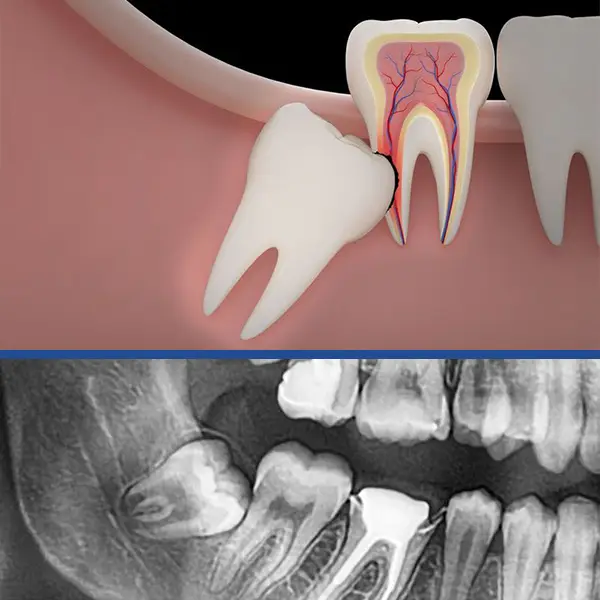Wisdom Teeth Extraction
Tooth Extractions at Twani's Dental Clinic
Wisdom Teeth Removal Procedure
Wisdom teeth are also called third molars , and are said to be “impacted “ if they are prevented in any way, from coming into the mouth properly. These teeth normally erupt into the mouth between 17 and 25 years of age. There is sometimes a delay of eruption and occasionally they never erupt. Frequently this is a sign that the wisdom teeth are impacted.

Why you Shouldn’t Keep Wisdom Teeth
There are many reasons for having impacted wisdom teeth removed even if they aren’t bothering you now! Most of these are discussed below;
- Tooth decay
- Orthodontic problems: Basically the pressure from impacted third molars has been blamed on teeth becoming crooked.
- Periodontal problems: A jammed wisdom tooth can cause food imapaction in the gum leading to a “pocket“ around the second molar hence loosening it.
- Gum infection: A partially erupted wisdom tooth can cause a painful infection if the gum flap is damaged or traps food, leading to difficulty opening the mouth, fever, and swollen neck glands.
- Cysts: If a trapped wisdom tooth’s development sac fills with fluid, it can expand and threaten adjacent teeth, the jawbone, and nerves.
- Tumors: There are documented cases where the lining of an impacted wisdom tooth's developmental sac has led to destructive jaw cancer.
Some Side Effects of Wisdom Tooth Surgery
Any surgical procedure no matter how routine– has certain occasional drawbacks of which the patient should be fully aware before
- Swelling or Bruising – Expect swelling of the jaw for a few days after surgery. The degree of swelling can depend on the difficulty of the surgery and the age and fitness of the patient.
- Stiffness in the jaws – you should expect difficulty in opening your jaws for a few days due to post-operative swelling.
- Dry sockets – Rinsing within 24 hours after removal of any tooth will cause loss of the blood clot leaving the raw bone exposed. This leads to slow painful healing. You should avoid rinsing until a day after surgery.
- Numbness or tingling in the skin or jaw - This is not common but may occur because some bruising of the nerve of the lower jaw may be unavoidable during surgery.
- Sinus opening – Occasionally the upper wisdom teeth are separated from the maxillary sinus only by paper-thin thickness of bone. In such cases, an opening into the sinus from wisdom tooth removal may be unavoidable.